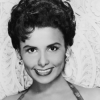Lena Horne

Lena Horne
Lena Mary Calhoun Hornewas an American Award–winning jazz and pop music singer, dancer, actress, and civil rights activist. Horne's career spanned over 70 years appearing in film, television, and theater. Horne joined the chorus of the Cotton Club at the age of 16 and became a nightclub performer before moving to Hollywood, where she had small parts in numerous movies, and more substantial parts in the 1943 films Cabin in the Sky and Stormy Weather. Because of the Red Scare...
NationalityAmerican
ProfessionWorld Music Singer
Date of Birth30 June 1917
CityNew York City, NY
CountryUnited States of America
Young people today would get a great deal of encouragement from knowing how close we could be if we had a man like Dr. King around.
The naked female body is treated so weirdly in society. It's like people are constantly begging to see it, but once they do, someone's a hoe.
It's not the load that breaks you down, it's the way you carry it. Carry it by the comfortable handles of gratitude for what's positive and that it is not worse, rather than the uncomfortable edges of bitterness for the negatives and that it is not better.
You have to be taught to be second class; you're not born that way.
Don't be afraid to feel as angry or as loving as you can, because when you feel nothing, it's just death.
You have to be taught to be second class; you're not born that way. But the slanting process is so subtle that you frequently don't realize how you're being slanted until very late in the game.
I found out along the way that they like you a little imperfect.
The best thing about living... Is the chance to keep on doing it!
Malcolm X made me very strong at a time I needed to understand what I was angry about. He had peace in his heart. He exerted a big influence on me.
I want to sing like Aretha Franklin. Before her I wanted the technical ability of Ella Fitzgerald.
You wouldn't be allowed to get on a particular bus, but you'd be asked to sign your autograph.
I'm not alone, I'm free. I no longer have to be a credit, I don't have to be a symbol to anybody; I don't have to be a first to anybody.
I learned from Ethel Waters, Duke Ellington, Adelaide Hall, the Nicholas Brothers, the whole thing, the whole schmear. [The Cotton Club] was a great place because it hired us, for one thing, at a time when it was really rough [for Black performers].
I was unique in that I was a kind of black that white people could accept. I was their daydream. I had the worst kind of acceptance because it was never for how great I was or what I contributed. It was because of the way I looked.